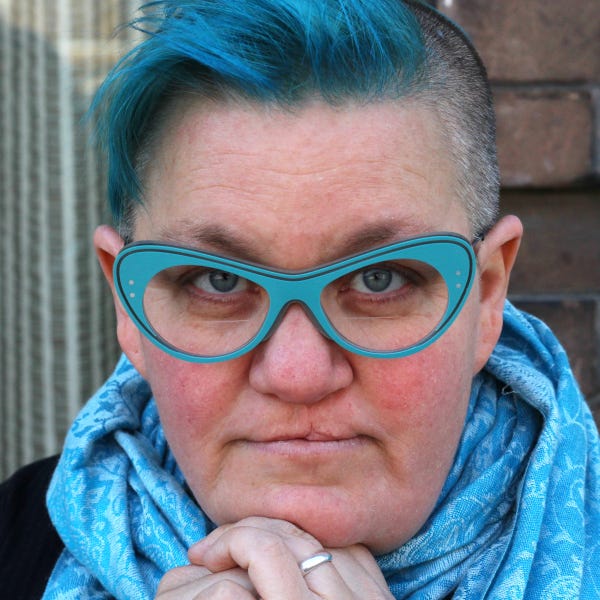Mini-Interview with Sage Tyrtle
If your writing was having a conversation with a reader, what is it trying to say? What secrets might it reveal?
Women are human beings. Kindness is vital. Empathy matters. Defend the defenseless. Bravery is protecting others even though you're scared.
What's more important the writer's intent or the reader's discovery?
Answering as a writer, I'd say the writer's intent. I have no control over the reader's discovery, all I can do is hope that they discover something wonderful and that it matches what I was trying to say.
Answering as a reader, I'd say the same thing. If the writer's done a good job, my discoveries as a reader are myriad.
What are your favorite things to write about? Those topics or items you can't stop thinking about!
I love speculative fiction as a way to talk about big issues. Taking an idea to its extreme and creating a world around it. The stories I love the most do this effortlessly.
The topics I can't stop thinking about are the same topics from the first question - misogyny, kindness, empathy, bravery. My characters are the people I aspire to be.
What's your favorite point of view? Why are you drawn to this particular voice/perspective?
I've loved the second person point of view since I read Bright Lights, Big City in 1984. I was like, "WAIT, YOU CAN DO THAT?!" And 38 years later I still love reading and writing second person point of view stories. There's a feeling of distance AND intimacy at the same time that I don't see anywhere else. But I mostly write in first person, as second person is a harder sell.
What's your favorite craft element to focus on when writing flash? Is there an element you wish you could avoid?
My favourite flash craft element is repetition. In a flash piece, repetition becomes a powerful and compelling tool, a tool that would be boring at best and obnoxious at worst in a longer piece.
I'd love to never describe another human being's appearance again - I can barely describe people I've known for 30 years, much less people I've made up in my head...
How do you know when a story is done or at least ready to test the submission waters?
My first reader says, "Yes. This is ready." (Sometimes I'm like, "It's ready!" and my first reader is like, "Except for fixing the end, and the middle, the beginning, and the main character, yup, it's totally ready.")
When looking for places to submit your flash, what are your priorities for finding a good home for your work?
Critically respected and widely read. Though it's a big thrill to see my name in a print magazine, I prefer literary magazines that are available online because I'm able to ask people to read my work without also asking them to spend money.
What do you know now about writing flash or other forms that you wished you had known from the beginning?
That I write best when my first draft is slapdash ideas, and my second draft is re-typing the story while looking at the first draft and improving every sentence, and drafts 3 to draft 1000 are re-typing until I arrive at the last and best polished version.
What resource (a book, essay, story, person, literary journal) has helped you develop your flash fiction writing?
Online writing workshops and online writing groups. Being able to read my work aloud right after I've written it makes writing exciting and I'm much less likely to stare at a screen thinking, "WHY DID I THINK I COULD WRITE? I AM A FRAUD."
What's your favorite way to interact with the writing community? Do you have any advice for writers trying to add to their own writing communities?
I run two free writing groups, Rain and Snow, which meet online weekly. I love hearing people's responses to the generative prompts I give, and it's been a joy to watch the people in the group become friends over time. My advice for writers trying to add to their own writing communities is to find something missing (there might well be other free online writing groups with opportunities to read work out loud, but I couldn't find any) and do their best to provide it themselves.
A novel, a micro, and a poem go to a bar together. What happens?
They get bored and go to the library instead.
If you could recommend a few flash stories or writers, who/what would it be?
Electra Rhodes
What story of yours do you want us to read?
This cnf flash piece, "Too Ugly for a Dog to Eat: A Cento Fairy Tale". For two months I combed Andrew Lang's late-1800s fairy tales for sentences containing the word "ugly" or "beautiful". I took the resulting sentences and created a new fairy tale, the kind of fairy tale I wish I could have read as a child. This story begins, "When you are six years old, you learn from Andrew Lang's Blue Fairy Book that your cleft palate makes you hideous. You learn from his Red Fairy Book that your pudginess is appalling, and from the Pink Fairy Book that your lazy eye is repulsive..."
Bio:
Sage Tyrtle's work is available or upcoming in X-R-A-Y, The Offing, and Apex among others. She's told stories on stages all over the world and her words have been featured on NPR, CBC, and PBS. She runs a free online writing group open to everyone. Twitter: @sagetyrtle



